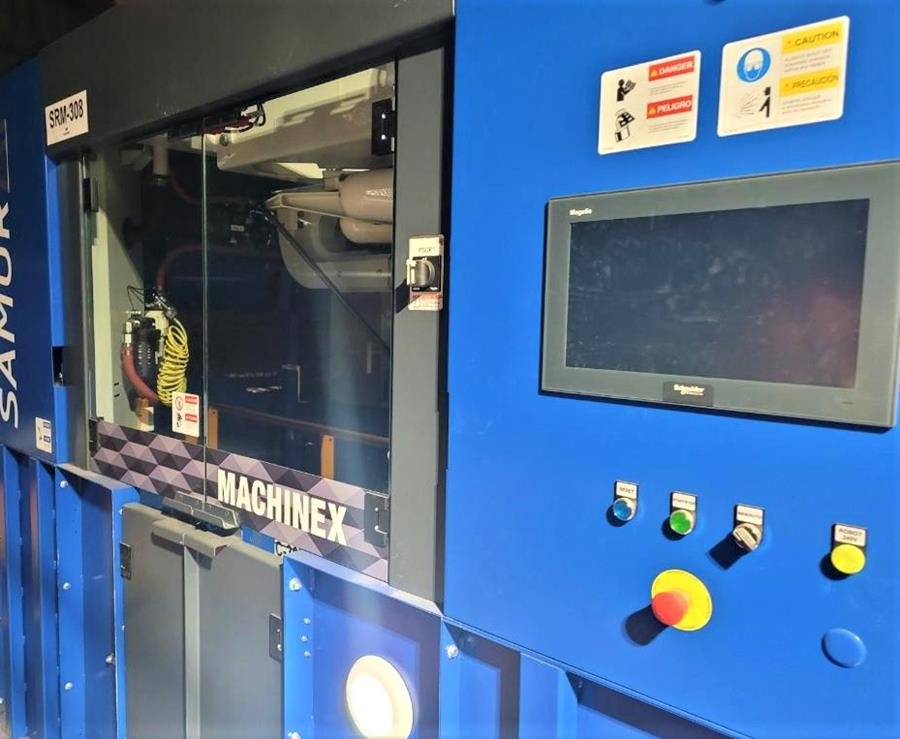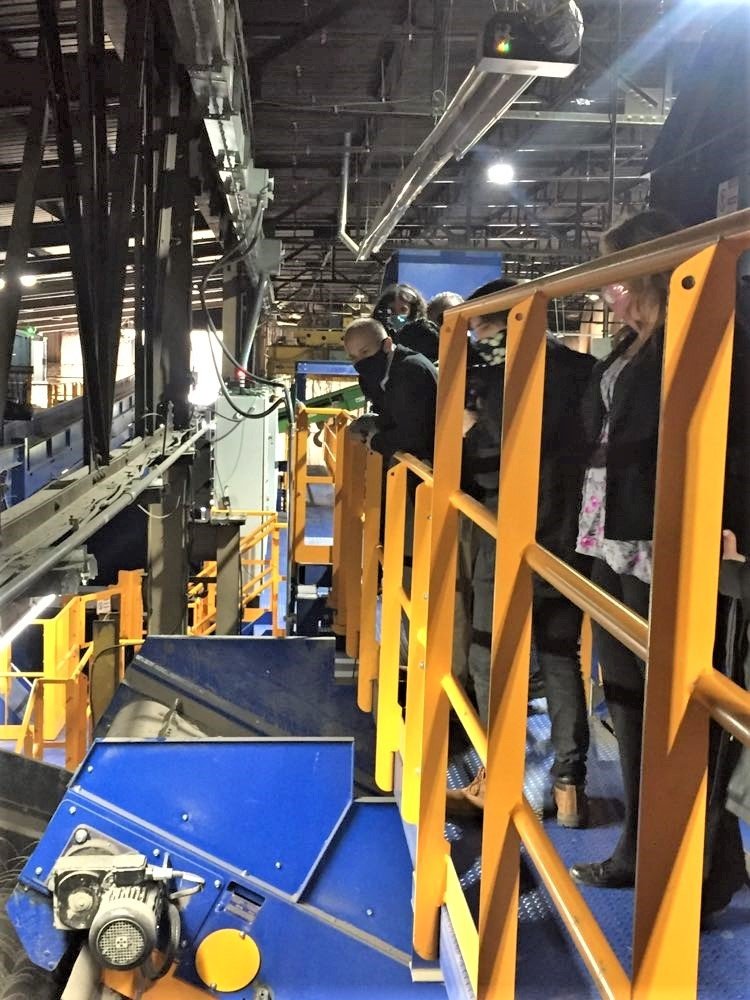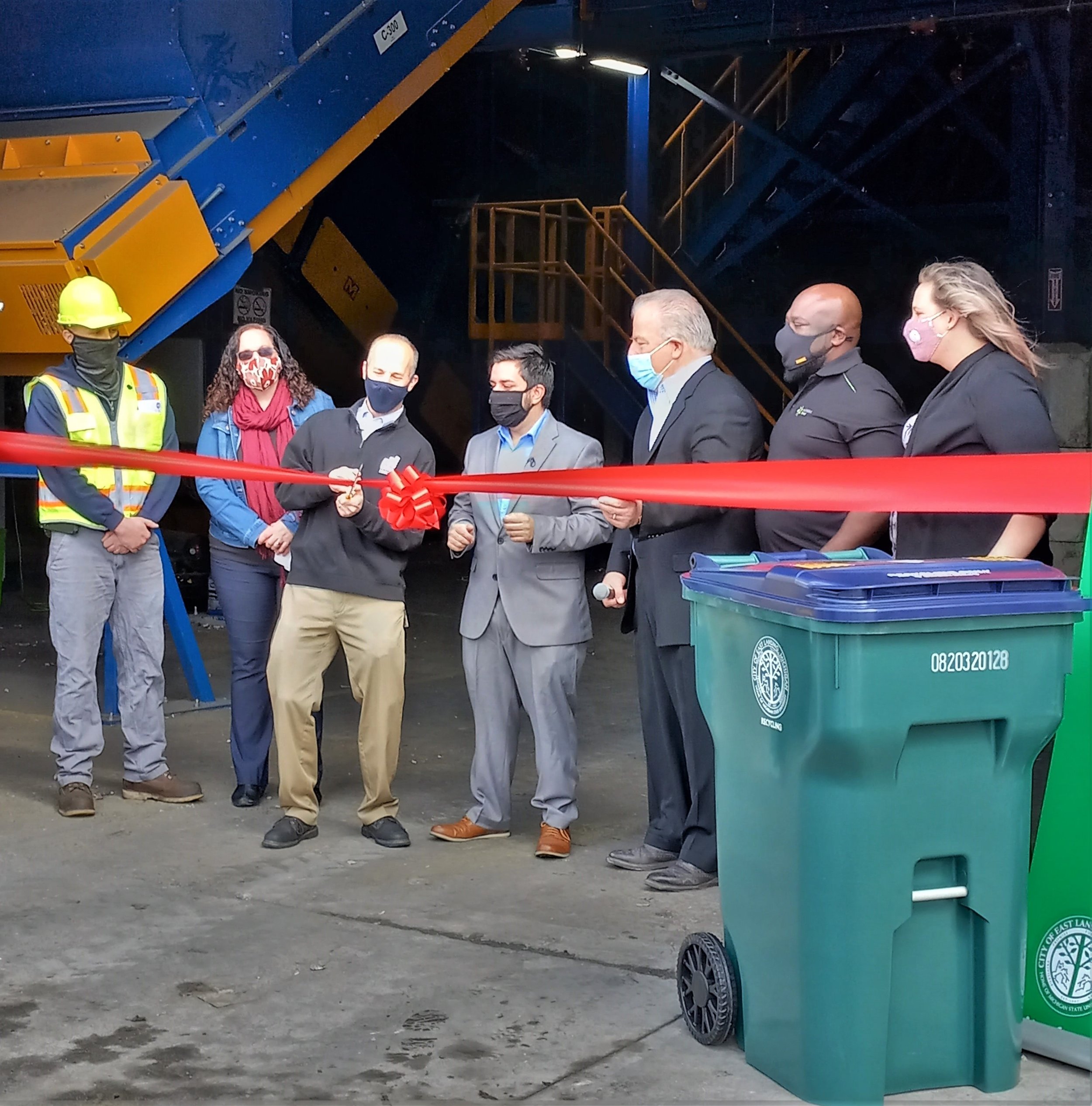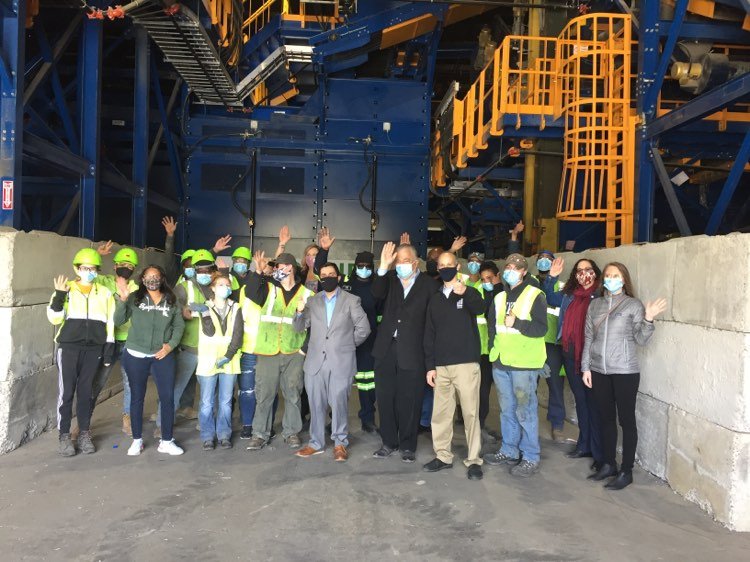Advancing Material Recovery in the Capital Region of Michigan: Emterra Group
Emterra Environmental, a Canadian leader in waste resource recovery, proudly opened a new MRF in Lansing in April of 2021. Built on a brownfields site as a private-public partnership with the cities of Lansing and East Lansing. This state-of-the-art MRF will improve recycling processing capacity and accessibility in the region. The facility is capable of processing 40,000 tons per year. Lansing and East Lansing combined will send 7,500 tons of recyclables annually. Previously, Lansing and East Lansing were sending their recycling for processing to the Detroit area. Emterra is currently looking for additional recyclables to supply the new MRF. The MRF accepts glass, cartons/paper cups, aluminum cans and foil, plastic bottles and containers, cardboard, mixed paper, newspaper, pizza boxes and boxboard.
Background
Emterra Group is an independent, family-owned and operated curbside recycling hauler and processor with a footprint that spans Canada with an emerging U.S. presence, primarily in Michigan. Originally founded in 1976 as International Paper Industries (IPI), Hong-Kong immigrant, Emmie Leung, ran the one-person business collecting used cardboard and paper from back alleys. Emterra now services 50+ communities in Michigan stretching all the way east to Port Huron and northeast to cover Michigan’s thumb region. The company also owns and operates a tire recycling facility, a liquids processing and glass cullet facility, is a partner in plastic recycling operations, and operates over 600 trucks. In 2018, Emterra created a new division, Ryse Solutions, to provide producer responsibility/stewardship compliance services.
Through every stage of growth, Emterra has deployed industry-leading technology and has played a key role in advancing the recycling industry in North America. Most recently, Emterra launched its first single stream U.S. MRF based in Lansing, Michigan in 2021.
The Emterra Lansing MRF is equipped with a state-of-the-art glass cleaning system with grant support from Michigan Department of Energy Great Lakes and the Environment (EGLE) and includes machine learning robotic sorting of food service packaging and paper cartons and cups, funded with EGLE grant support and industry support from the Carton Council and the Foodservice Packaging Institute/Paper Cup Alliance.
Emterra’s network of MRFs process and market 425,000 tons of mixed recyclables annually and support over 1,000 employees through its 40+ locations.
Emterra is a true entrepreneurial success story and is a model for starting small while dreaming big and leveraging innovation and partnership to drive success. This story will look at how Emterra expanded from Canada across the Great Lakes into Michigan to open one of the most advanced MRFs the state has ever seen.
The Challenge
Emterra had been operating in Michigan for nearly 10 years with collection contracts throughout the state. In total, they had a fleet of over 100 trucks servicing over 60 Michigan municipalities, in addition to industrial, commercial, and institutional clients. The material they collected was being processed by third party MRFs in the vicinity.
However, it became apparent that there was a gap in processing capacity in the mid-Michigan area, home to the state capital in Lansing, and a central point between population centers Detroit, to the east, and Grand Rapids, to the west. Meanwhile, glass recycling was becoming more and more difficult to sustain and was a challenge to collect, process and market throughout the state. The cities of Lansing and East Lansing, searching for recycling partners to provide a public/private partnership solution, invited industry players to respond. Emterra was on the list.
This opportunity led Emterra to target the capital region as a location to develop its first U.S. MRF, designed to be a regional hub with an advanced glass processing system and educational component – providing recycling solutions not just to the Capital area, but also to the surrounding region stretching all the way east to the Canadian border.
The team
Emterra engaged a broad team to advance the concept into a shovel ready project. First and foremost, they worked with their local municipal partners, including the cities of Lansing and East Lansing, and the capital region counties – Ingham, Eaton, and Clinton - to sort out many of the challenges with growing comprehensive recycling processing capacity in the capital region.
By demonstrating a commitment to glass recycling, Emterra brought together a coalition of glass recycling stakeholders to support the project, including:
The Glass Packaging Institute (GPI) and their glass bottle producing members O-I, Ardaugh, and others;
The Glass Recycling Coalition (GRC) which provides certification of the MRF glass cleaning system; and
Glass end market partners Rumpke Recycling and Strategic Materials.
Revital Polymers, will process plastics #3-#7 generated by the Emterra MRF. The post-consumer recycled resin pellets will feed industry demand for recycled content, including Michigan’s auto industry.
Industry partners, the Carton Council, and the Foodservice Packaging Institute, joined forces with Emterra to bring advanced robotic sorting solutions to the MRF to sort paper cups and paper cartons, as well as other foodservice packaging including pizza boxes for delivery to domestic markets. Those paper cups and cartons are now being recycled into new soft tissue products at Great Lakes Tissue in northern Michigan, expanding manufacturing jobs right here within the state.
In addition, local economic development agencies, Resource Recycling Systems and the Michigan Recycling Coalition provided key support. The EGLE was also essential and provided a $250,000 grant to support this project and providing matching funds for the Foodservice Packaging Institute and Carton Council equipment grants.
The Solution
Emterra revitalized a moth-balled, publicly-owned Board of Water and Light operations site, a registered brownfield site, into their new MRF. The cleanup of both site and building were worked into the project. The location of the MRF in Lansing falls within a two-hour drive of 90% of Michigan’s population making it an effective hub in a hub-and-spoke model. Rural areas and lower density suburban and exurban areas function as satellite transfer spokes, feeding the regional Emterra MRF.
The company worked with Machinex to design and install the 20-ton per hour MRF system (40,000 tons per year) that includes a state-of-the-art glass cleaning system, optical sorters, ballistic separators, screens, and advanced machine learning robotic sorting. This system allows Emterra to expand glass recycling access while accepting, recovering, and marketing a broad range of paper, metal, and plastic recyclables.
The site also be home to the Capital Area Recycling Education (CARE) Center, that engages and educates the surrounding communities about the recycling system and their role within it.
THE RESULT
Building infrastructure and creating jobs in the tri-county region will benefit everyone: communities with established recycling services will benefit from keeping materials in the region and avoiding the cost of hauling recyclables to other parts of the state; communities without established recycling services will benefit from the opportunity to build a successful recycling program.
Emterra is working towards increasing the amount of materials processed by this facility as well as increasing glass collection, processing, and a variety of end-markets with this project. More specifically they estimate that they can increase their initial glass volume of 5,000 tons a year to 10,000 tons a year. Their vision overall is to provide increased glass recycling efforts and markets throughout the Michigan area and to create a community that thrives on the use of recycled sustainable materials.
This project exemplifies the collaborative, forward-thinking approach that has allowed Emterra to grow into an international recycling powerhouse working to propel the circular economy and captures the spirit of what NextCycle Michigan aims to support.




